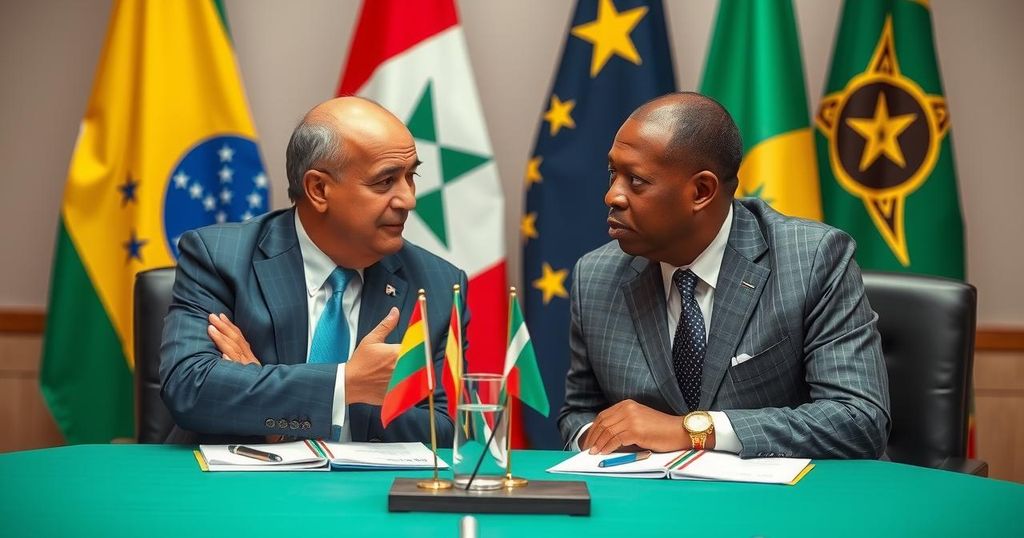Ethiopian President Abiy Ahmed and Somali President Hassan Sheikh Mohamud have reached a critical agreement, mediated by Turkish President Recep Tayyip Erdoğan, to resolve a maritime access dispute stemming from Ethiopia’s landlocked status. This agreement aims to stabilize relations and potentially enhance trade, with further technical discussions scheduled for February.
Ethiopian President Abiy Ahmed and Somali President Hassan Sheikh Mohamud have reached a significant agreement to resolve a yearlong conflict concerning Ethiopia’s access to the Arabian Sea. This pivotal deal was announced in Ankara after extensive negotiations facilitated by Turkish President Recep Tayyip Erdoğan, who has positioned Turkey as a crucial mediator in the Horn of Africa. The agreement aims to mitigate tensions and promote cooperation between the two nations.
The conflict primarily revolves around Ethiopia’s status as the world’s most populous landlocked country, which was exacerbated by Eritrea’s independence in 1993. Ethiopia’s economic growth has been hindered due to its lack of direct sea access. In January, Ethiopia signed a contentious agreement to lease a port from Somaliland, a breakaway region in Somalia, which prompted Somalia to threaten the expulsion of Ethiopian troops engaged in combating al-Shabab militants. The potential for this dispute to escalate into a conflict reminiscent of the Ogaden War of 1977-78 has raised considerable concerns in the region.
Turkey’s involvement arises from its extensive connections to both Ethiopia and Somalia, as well as its vested interest in maintaining regional stability. Turkey operates its largest overseas military base in Somalia, where it has been instrumental in training Somali armed forces. Furthermore, during the Tigray conflict from 2020 to 2022, Turkey supported the Ethiopian government by supplying advanced military drones. As expert Emre Peker from the Eurasia Group notes, “The agreement will help make Turkey into an even more relevant power in the region, with Ankara pitching itself as a security partner for African countries.”
Turkish investments in Ethiopia have surpassed $2 billion, second only to Chinese investments, indicating a profound economic relationship between the two countries. The agreement is anticipated to not only enhance Turkey’s diplomatic stature across Africa but also to bolster its commercial interests through increased trade opportunities resulting from Ethiopian access to Somali ports. Importantly, Turkish businesses are expected to gain preferential treatment in forthcoming infrastructure projects.
Moving forward, representatives from Ethiopia and Somalia are scheduled to reconvene in February to finalize the specifics of port access. This next meeting will be crucial in ensuring that the agreement is implemented effectively and contributes to lasting peace in the region.
The conflict between Ethiopia and Somalia originated from Ethiopia’s need for access to the sea due to its status as a landlocked nation since Eritrea’s split in 1993. The historical context of the region, coupled with current geopolitical dynamics involving port leasing and armed forces, has fueled the ongoing dispute. The situation is complicated by military, political, and economic dimensions that have global implications, particularly concerning Turkish involvement that underscores its growing influence in African affairs.
In conclusion, the recent agreement between Ethiopia and Somalia, mediated by Turkey, represents a significant step towards resolving a protracted conflict over maritime access. Amidst historical tensions and contemporary geopolitical shifts, this development highlights Turkey’s emerging role as a key player in African diplomacy. As both nations prepare for future discussions, the implications of this agreement could reverberate throughout the region, fostering enhanced cooperation and economic growth.
Original Source: www.gzeromedia.com







